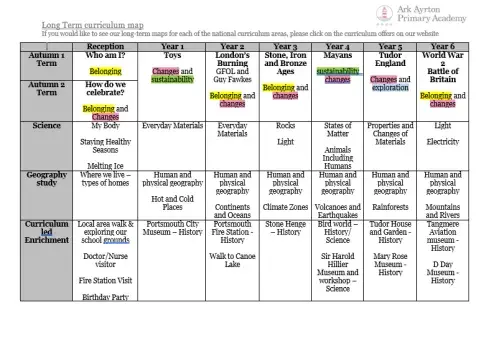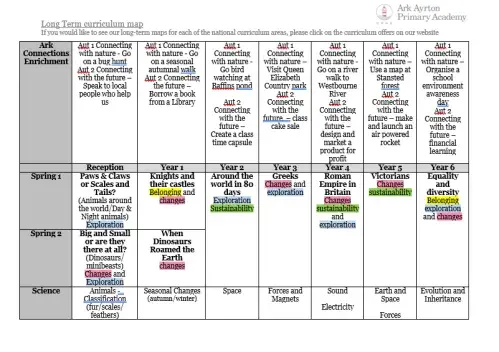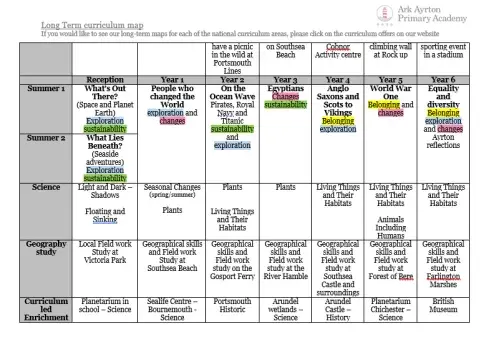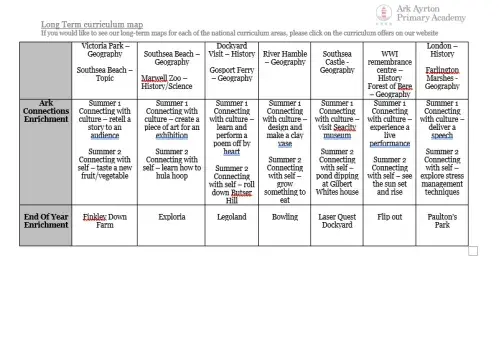Aims
A conscious and responsive Curriculum for our children
At Ark Ayrton, we have created a conscious and responsive curriculum, with reading at its heart. Our Horizons Curriculum is born from our strong belief that any child, regardless of their starting point, has no limit to what they can achieve. We are proud that within our curriculum, there is something to cater and nurture every child’s interest. Our Learning Zones provide children with amazing spaces to shine brightly – developing their talents, skills, and range of experiences available to them.
Our curriculum is responsive to local, national, and global issues and is constantly evolving to ensure that our children are well prepared for life beyond Ayrton.
Underpinning our curriculum are our core strands: belonging, changes, exploration and sustainability. Alongside these, sit our school values - kindness, respect, resilience, inclusion, independence, and community.
Why do we teach what we teach?
The intention of our curriculum is that by the end of Year Six, every child will:
- understand their place within our diverse, local community and wider world, where they value and accept the diverse range of beliefs and celebrate differences that make up the fabric of our society, treating all people with kindness, fairness, and respect. Through our character development, they will have the skills and confidence to challenge stereotypes, discrimination and voice their own opinions on current affairs, which are routed in social and moral justice. They will uphold their school values by having the opportunity to hold a position of elected responsibility or leading a group of peers, becoming active citizens within their school community.
- have the skills and knowledge to be responsible, critical and reflective future citizens, who will know how to maintain and sustain resources, in order to protect the environment locally and globally. They will know the impact their carbon footprint has on the wider world and design actions that will lead to a sustainable future for everyone.
- be confident and curious explorers with the skills to research and broaden their knowledge of the world, their interests, and experiences to prepare them for future opportunities and possibilities. Their ambition and constant desire to be inquisitive and challenge stereotypes, will drive their thirst for learning and enable them to exceed expectations and discover the world beyond their local community.
- be able to respectfully analyse, evaluate and reflect upon cultural, social, religious, political, and technological changes throughout history. They will understand the impact of these changes upon their identity, their community, and the wider world around them. Children will be able to make informed future decisions based on their understanding of the changes in the past in order to become responsible active citizens, who contribute positively to society.
- have mastered the core curriculum and be able to apply taught skills, vocabulary, and knowledge in meaningful contexts. Children will build on their prior knowledge, demonstrating an in depth understanding of their learning in readiness for the next stage of their education.
- have had the opportunity to attend residential visits to develop confidence, independence, and resilience through challenging themselves in new settings with new experiences.
- have been offered a wide variety of extracurricular activities and the opportunity to compete and perform outside of school.
- have learnt practical skills for everyday life, including cooking, sewing, organising, budgeting, saving, and planning.
- meet a range of diverse professionals from a wide variety of jobs and careers, to inspire their future life choices and careers
Implementation
How do we teach what we teach?
Rooted in pedagogy and education research, leaders have made the deliberate choices over core knowledge and skills to be taught and in what order. In addition to this, leaders have made the conscious decision to ensure every child has a broad and balanced curriculum, which includes non-core subjects in the morning to raise the profile and importance of foundation subjects.
Lesson Structure
- Knowledge for lessons is frontloaded through subject knowledge organisers, which contain links to videos and educational games. These are uploaded to our homework platform.
- gaps analysis from data collected is used to ensure that the sequencing of knowledge and learning is adapted and personalised to meet the needs of all learners
- every lesson starts with a do now in order recall and build on prior knowledge or address a misconception identified from the previous lesson
- whole class, subject specific reading, (for example history, science and geography) reading is used to front load the knowledge
- every lesson has a WALT, which all children work to achieve, however the success criteria for each child creates a personalised, adapted learning path
- independent learning tasks are planned with ‘productive struggle’ in mind according to how best to achieve the WALT of the lesson, often using the structure of ‘I do, we do, you do’ culminating in a learning review or Exit Ticket for pupils to evidence their progress in achieving the WALT or key learning question
- all children are expected to apply their learning independently for a portion of the lesson
- learning is enhanced through our extensive programme of trips, visits, workshops and residentials throughout the year.
- A systematic approach to homework throughout the school ensures children develop habits for learning independently throughout their academic career, gradually raising the expectations of pupils to complete high quantity and quality of learning outside of the school day.
Inclusion and Personalisation
- Children learn in a carefully planned, mixed attainment seating plan
- We use the Graduated Approach to identify the right level of timely, effective intervention for each pupil with SEND. We begin with Wave 1 (universal) approach, prioritising relentlessly high-quality teaching and learning strategies. For example, these pupils benefit particularly from the routines and structure of our lessons which reduce cognitive load: from the use of Do Nows to recall and apply key knowledge and from checking for understanding through data driven use of Cold Call and Intentional Monitoring.
- Where pupils with SEND require further support, we plan Wave 2 (targeted) 1:1 and small group interventions to promote rapid progress and nurtured development of every child. For children with high levels of need, we liaise with external partners to deliver Wave 3 (specialist) support. We take on board feedback readily when designing inclusive learning for each child. All staff contribute to Individual Learning Plans for children with SEND. We review children’s’ SEND targets termly and expect all our staff to know our children’s’ needs, what we do to address them and what success looks like.
- All staff contribute to Individual Learning Plans for pupils with SEND. Targets are reviewed regularly, and we expect all our staff to know their children’s needs, what to do to address them and what success looks like.
Continuous Professional Development
- Every class facing member of staff receives either a 15 minutes or fortnightly coaching visits, where the highest leverage action step is identified, practised, and actioned. Staff then self-refer to another practitioner to see the action step done well.
- Professional development is driven by identified areas of need through leaders’ observations and data outcomes.
- Dedicated co-planning time with both the SENDCo and members of SLT enables staff to intellectually prepare for their lessons using data as a starting point to ensure gaps are plugged and their children make progress.
- Year group partners work together to share expertise and the learning journey of their children before they plan and teach a unit.
Impact & Assessment
How do we know what children have learn and how well they have learnt it?
Both leaders and teachers use data in the form of formative, summative and qualitative to measure what the children have learnt and how well they have learnt it.
- Teachers use intentional monitoring through mini plenaries and assessment for learning opportunities, such as white boards, exit tickets and over the shoulder marking, to strategically gather data on pupils’ knowledge and check for understanding of what has been taught.
- In Early Years, we run a key worker model whereby evert member of staff uses observations to gather data on our youngest children. These assessments are tracked to Smart Grade, which enables us to measure children’s starting points and track their progress based on their monthly age development milestones.
- As reading is at the heart of our curriculum and because we know that our children have significantly low starting points, we have a robust system in place to assess children’s chronological reading age, fluency, and early reading. A more in-depth overview of this, can be found in our Reading Overview document
- Deliberate practice is embedded to assess the extent to which children learn and remember. This is gathered using knowledge quizzes, which test against key knowledge thresholds which leaders set, exit tickets, do nows, diagnostic writes, pre and post unit assessments and end of year assessments
Ultimately, our aims are long term, and the impact we wish to see goes far beyond our assessment outcomes at the end of Year Six. It is shown in who our children are when they leave us and in their later lives – the well-rounded, informed, conscientious, aspirational individuals who go on to thrive and achieve well, contributing positively to society.
Curriculum Overview




